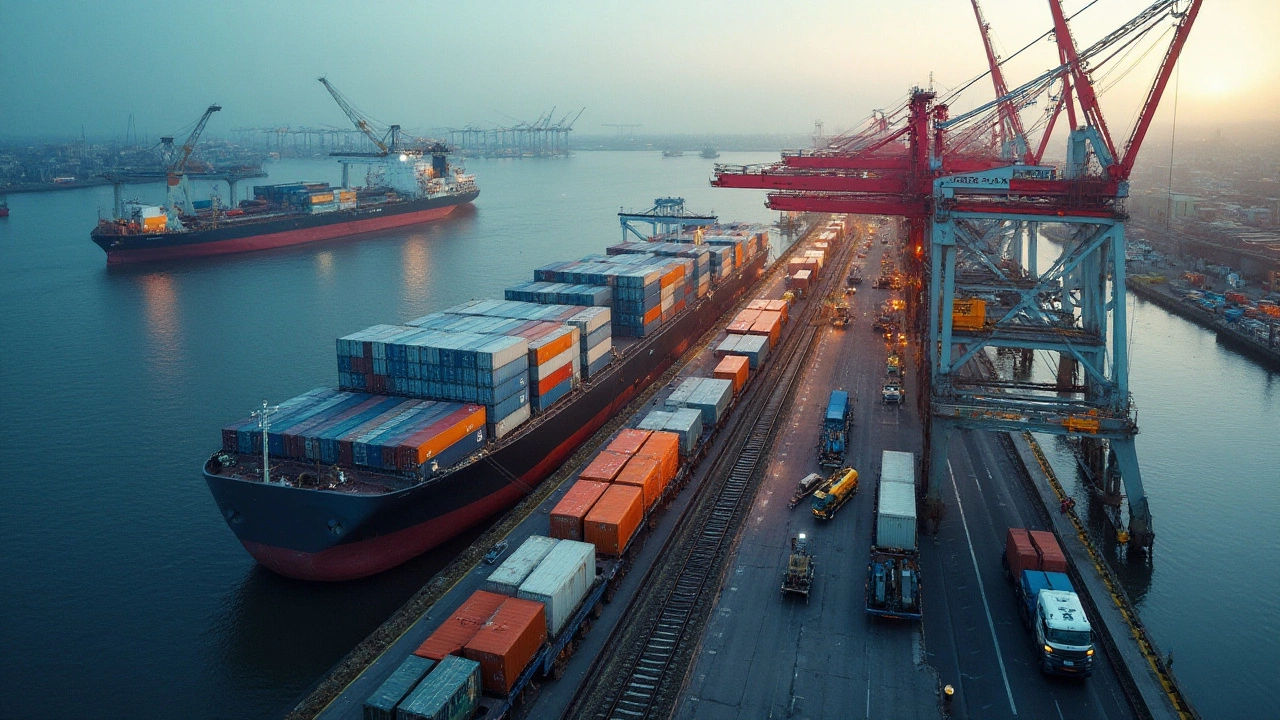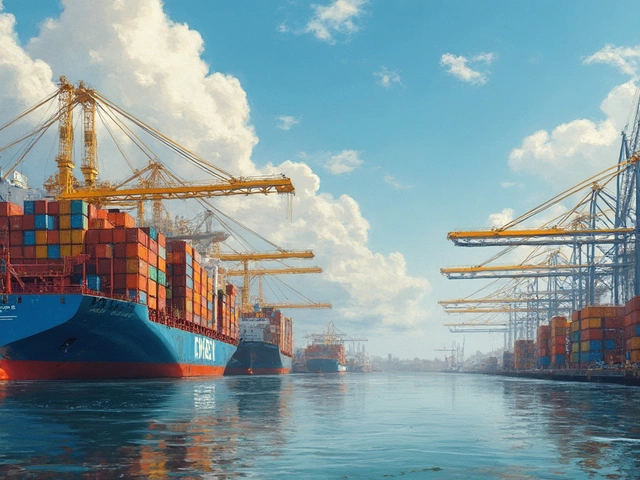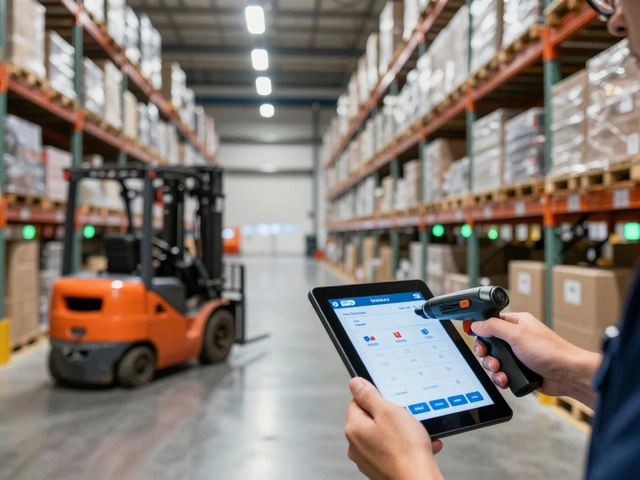In recent years, the logistics industry has seen a remarkable transformation, essentially redefining how goods are moved across the globe. As e-commerce continues to boom, the expectations of consumers for swift and reliable delivery have reached new heights. This shift has not only amplified the demand for logistics services but has also placed the industry at the forefront of technological innovation.
The role of logistics companies goes beyond just transportation and warehousing. They are now integral to the intricate dance of supply chain management, ensuring that each part of the puzzle fits perfectly to meet consumer needs. With this increased responsibility, comes a wealth of opportunities for those seeking careers in the industry, promising growth and excitement.
- Current Demand Trends in Logistics
- Impact of Technological Advancements
- Career Opportunities in Logistics
- Future Outlook of the Logistics Industry
Current Demand Trends in Logistics
The logistics industry is bustling with activity like never before, driven by several key factors that have collectively heightened the demand for logistics services. This surge is, in part, a product of the unprecedented rise of e-commerce, which has been reshaping shopping behaviors worldwide. With consumers preferring the convenience of shopping from anywhere at any time, businesses are under immense pressure to enhance their logistics infrastructure to meet these expectations. The quick delivery guarantees offered by major platforms have set new benchmarks, compelling logistics companies to innovate constantly.
A large part of this logistics boom can be attributed to the rapid advancements in technology. Innovations such as automation, robotics, and artificial intelligence have begun to transform traditional logistics operations. These technologies help in optimizing routes, predicting demand, and efficiently managing inventory. The implementation of such smart technologies has become a necessity rather than a luxury, propelling the industry's growth trajectory even further. The willingness to adopt these advancements facilitates not only efficiency but also the ability to offer competitive delivery timelines and prices.
Globalization continues to play a significant role in expanding the scope of logistics demand too. As businesses aim to tap into new markets, the complexity and length of supply chains have increased. This complexity demands sophisticated logistics solutions that ensure smooth transmission of goods across borders, adhering to various international trade regulations. This globalization wave is not limited to big corporations; even small and medium enterprises are exploring international avenues, relying on supply chain management to navigate these intricate processes.
The onset of sustainability trends is another contributing factor. Consumers are increasingly aware of environmental issues, prompting companies to incorporate eco-friendly practices in their logistics operations. The push towards green logistics has seen companies adopt measures like using electric vehicles for transportation, optimizing delivery routes to reduce fuel consumption, and enhancing packaging techniques to minimize waste. These efforts to align with environmental concerns have reshaped logistics in terms of operations and consumer relations.
The importance of logistics in modern-day commerce is succinctly captured by a recent report from the Council of Supply Chain Management Professionals: "Successful logistics strategies are pivotal not just for fulfilling consumer expectations but also for ensuring the resilience of the global economy."
Moreover, changes in consumer demographics, such as the rise of younger, tech-savvy generations, have amplified the demand for logistics services. These consumers are accustomed to instant gratification, expecting same-day or at least next-day delivery options, pushing businesses to refine their customer service and delivery modules. As these dynamics continue evolving, it is evident that the trends shaping logistics now will have a long-term influence on how trade and e-commerce progress in the coming years.

Impact of Technological Advancements
The logistics industry's evolution is closely tied to technological progress, which has revolutionized the way operations are conducted. One of the most prominent technologies reshaping this field is artificial intelligence (AI). By analyzing vast amounts of data, AI can optimize delivery routes, forecast demand patterns and even predict potential disruptions, thus offering a smoother operational flow. The incorporation of AI enhances accuracy and reduces costs by minimizing human error, making logistics more efficient than ever before.
An equally significant advancement is the use of automation in warehouses. Robotic systems are increasingly taking over repetitive tasks, such as sorting and packing, which accelerates warehouse processes and minimizes physical strain on workers. This not only speeds up operations but also allows human employees to focus on more complex problem-solving tasks, improving overall productivity. Supply chain management greatly benefits from these automated solutions, allowing companies to meet rising consumer expectations more effectively.
Blockchain technology is another game-changer, especially in terms of transparency and traceability in the logistics industry. By creating a decentralized ledger of all transactions, blockchain ensures that every step of the delivery process is recorded and visible to all parties involved. This transparency helps in reducing fraud and errors, thereby building trust among consumers and businesses alike. According to a report by DHL, blockchain's ability to create trusted partnerships is invaluable for maintaining the security and integrity of global supply chains.
"Blockchain has the potential to revolutionize the logistics industry by enabling more transparent and efficient systems," says a report from Maersk, highlighting its transformative power.
Additionally, the rise of Internet of Things (IoT) devices provides unprecedented visibility into logistics operations. By equipping vehicles and shipping containers with sensors, companies can monitor the condition and location of their goods in real-time. This real-time tracking capability means logistics companies can respond swiftly to any issues as they arise, such as delays or damages, ensuring that deliveries remain on schedule. The ability of IoT to provide detailed insights into every facet of logistics operations further elevates the standard of efficiency and responsiveness in the industry.
Finally, the trend of green logistics is supported by technological advancements aimed at reducing the carbon footprint of transportation activities. Electric vehicles and route optimization software play considerable roles in this shift towards sustainability. As logistics companies increasingly adopt environmentally-friendly practices, technology ensures they maintain efficiency while promoting ecological responsibility. An illustration of this is UPS's commitment to sustainability; they leverage advanced algorithms to reduce fuel consumption, cut emissions, and consequently, decrease operation costs.
In summary, the integration of new technologies is not just enhancing logistics operations but also transforming the sector into an innovative, adaptive, and responsible industry. The continuous development of these breakthroughs promises even greater improvements and highlights the importance of staying ahead in a rapidly changing market landscape. Anyone venturing into or currently working within this sector should remain attuned to these advancements, as they are indispensable for the future competitiveness and success of logistics companies.

Career Opportunities in Logistics
The logistics sector is brimming with diverse career possibilities, appealing to those who thrive on dynamic challenges and innovation. Over the years, the field has evolved beyond traditional roles, incorporating technology and strategic planning into its core. This evolution has paved the way for new, exciting roles that cater to different skill sets and interests. For instance, supply chain analysts play a critical role in optimizing processes, ensuring efficiency, and reducing costs. Their work is essential in today’s market, where margins are tight, and competition is fierce.
Moreover, the rise of e-commerce has increased the demand for skilled logistics professionals who can manage the complexities of global supply chains. Companies now look for experts who can navigate international trade regulations, manage customs processes, and anticipate market trends. Logistics managers are at the helm of these operations, coordinating various stakeholders to ensure goods are delivered on time and in flawless condition. This task requires a keen eye for detail, outstanding organizational skills, and an ability to adapt swiftly to changing circumstances.
Logistics demand is not only pushing for efficiency but also sustainability. As businesses recognize the environmental impact of their activities, there is a growing need for sustainability officers within the logistics industry. Their job is to devise and implement eco-friendly practices that reduce carbon footprints while maintaining operational efficiency. This focus aligns with the increasing consumer preference for green products and services, making these roles pivotal in shaping the future of logistics.
"Logistics professionals must possess a deep understanding of both the current and future landscape of supply chains," says Dr. Jane Smith, a leading logistics researcher. "The industry is now more about integrating innovative solutions and sustainability efforts into every organizational level."
As the sector grows, so does the demand for specialized skills. Training programs and certifications have become critical in helping professionals stay ahead. Programs in logistics and supply chain management offer foundational knowledge and equip candidates with the latest tools and technologies. Many universities now offer logistics as a major due to its importance in modern business education. Additionally, professional certifications, such as Certified Supply Chain Professional (CSCP) or the Logistics and Supply Chain Management certification, add an edge to one’s career prospects.
Companies continuously seek innovative talent to harness the power of emerging technologies like artificial intelligence, blockchain, and the Internet of Things (IoT). These technologies are revolutionizing how logistics operations are conducted, ensuring accuracy and efficiency. Roles such as logistics data scientists or AI specialists are becoming common, tasked with analyzing large datasets to uncover actionable insights and trends. The ability to interpret such data is increasingly valuable, as it allows companies to predict disruptions, streamline operations, and enhance customer satisfaction.

Future Outlook of the Logistics Industry
The logistics industry is not just keeping pace with the rapid changes in global commerce; it's charging ahead, spearheading innovation and strategies that drive economic growth. One prominent trend shaping the future of logistics is the integration of advanced technologies such as artificial intelligence, machine learning, and blockchain. These technologies are revolutionizing supply chain management, ensuring more efficient routes, real-time tracking, and enhanced transparency. With the rise of logistics demand, companies are investing in predictive analytics to anticipate market shifts, optimize inventory, and reduce waste. This evolution is not just enhancing operational efficiency but also significantly cutting costs.
The future landscape is also being influenced by sustainability considerations. As environmental awareness grows, logistics companies are under pressure to adopt greener practices. Electric and autonomous vehicles, powered by renewable energy sources, are becoming more common, reducing carbon footprints and supporting eco-friendly shipping solutions. Additionally, urban logistics—sometimes known as 'last-mile delivery'—faces unique challenges as companies seek to deliver goods faster within congested city environments. Here, drones and robotic couriers are emerging as viable solutions to alleviate traffic and minimize delivery times. This transformation is pivotal, considering the ever-rising expectations in the e-commerce sector.
The World Economic Forum emphasizes, "By 2030, it is estimated that the logistics industry will achieve a 30% reduction in emissions, thanks to innovations and forward-thinking policies."
Moreover, globalization continues to expand the horizon of logistics companies. Emerging markets are opening new opportunities, requiring robust logistics networks that can handle complex international trade dynamics. The geopolitical landscape will likely influence these networks, as shifts in trade policies and tariffs create both challenges and prospects. A close eye on regulatory changes will be essential for companies to thrive internationally. It's also worth noting that the logistics sector offers promising career prospects. As these dynamics evolve, there is a growing need for skilled professionals equipped with digital competencies, fostering an environment ripe with innovation.
The COVID-19 pandemic has undoubtedly accelerated some of these trends, serving as a catalyst for transformation within the industry. Companies have learned to adapt quickly, building resilience against potential future disruptions. The future, while uncertain, is brimming with potential for those prepared to embrace it. As the industry moves forward, strategic partnerships and collaborations will be crucial in crafting a landscape that is not only efficient but resilient and adaptable. Ultimately, the logistics industry is poised for a future where technology, sustainability, and global connectivity converge, promising a dynamic and promising horizon.





